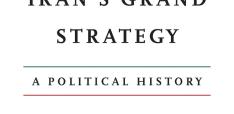Zeitenwende enters the Twilight Zone of International Law

Cornelius Adebahr argues that we are creating a world without rules.
The Israeli attack on Iranian military and nuclear facilities in the early hours of 13 June marks a watershed – for the region, but possibly also for the world. For the reaction of the international community will show whether there is still something like an international order in the medium term that can contain interstate action. Or whether the law of the jungle, which has already led to permanent and recurring wars in past centuries, will once again apply.
True, this is not primarily about Iran's nuclear program, let alone Benjamin Netanyahu’s political future. The Israeli prime minister may calculate that the continuation and escalation of the ‘seven-front war’ that he himself has proclaimed will prevent him from being held politically accountable at the ballot box or legally by the courts. His argument that he had to avert an immediate danger to his country with the attack is implausible in view of the ongoing nuclear talks between Iran and the USA. And even if the reports from the International Atomic Energy Agency pointed to increased uranium enrichment and a lack of co-operation on Tehran’s part, Iran was still months away from actually building a bomb – if that decision was made – even in Netanyahu's words.
The US president can't get out of this act either, even if he first announces that Israel acted alone, only to praise the attacks the next moment and pledge his support to the country. Above all, however, Donald Trump was the one who brought about the current situation – in which an increasingly less controlled Iranian nuclear programme could be perceived as a regional threat – in the first place by withdrawing from the nuclear agreement in 2018. And who has still not negotiated the ‘better deal’ that he promised in his first election campaign in 2016.
And the Europeans? Once again, they are spectators in a play whose actors they think they know, but whose dramaturgy they do not understand – and in which they nevertheless believe they have to intervene.
What do we know about the feeling of living in a state that has been fought against by its neighbours since its foundation out of a historical catastrophe, threatening to brutalise itself in the process and in which deep inner rifts are opening up between liberal and religious-nationalist attitudes at the same time? What do we know about the people in a country with several thousand years of history, who brought down an authoritarian monarch around 45 years ago, only to be oppressed by a theocratic class and marginalised by the majority of the Western world ever since?
And how can we understand what is going on in the mind of the most powerful man in the world (the one in Washington, not the one in Beijing), for whom all international conflicts are just deals that need to be closed because everyone – like him – is surely only concerned with their own economic advantage?
What we can – and should – understand, however, is the great astonishment in large parts of the world at the selective application of rules or the arbitrary demand that others comply with them. In other words, to use the two most prominent cases since 2022 as a striking example, we cannot continue to deplore and fight the breach of international law by one side (Russia against Ukraine) and remain silent in the face of another such violation (Israel in Gaza) and expect that this would not have wider consequences.
Yes, the overall situation is complicated, and each case requires separate consideration, including of its history and of possible crimes on either side. Yet, that is exactly what international law is for: generally applicable rules that (should) apply to all states, regardless of whether they are allies or not. In this specific case, this means that anyone who, like the German government, preemptively legitimises Israel's attack without cause – and therefore in violation of international law – with reference to Iran's possible violations of the Non-Proliferation Treaty, while condemning, “in the strongest possible terms”, the counter-attack as an “indiscriminate Iranian attack on Israeli territory”, is clearly applying double standards.
It is this hypocrisy in dealing with international law that contributes more to the erosion of the international order in the long term than the open violation of rules by some autocrats (or the United States with its invasion of Iraq in 2003). For even within a society, thousands of violations of the law take place every day; but as long as they are impartially prosecuted and punished, the underlying set of rules remains recognised. However, if this clearly only applies to some and not to others, i.e. if the latter are ‘more equal’ than the others, then the existing order and its advocates lose their credibility.
Once again, there may be reasons, good and bad, for Europe to reflexively side with Israel and the USA in the current situation, from history to concerns about the rupture of the transatlantic alliance. It is possible to conclude that insisting on international law – the prohibition of a war of aggression, the prohibition of armed attacks on nuclear facilities, the rules of international humanitarian law to protect civilians in conflicts, etc. – is practically impossible.
However, we must be aware that we are creating a world without rules, in which small and medium-sized states are at the mercy of major powers such as the United States, China or Russia. That Europe will cease to be defenders of international law and the order established after the Second World War. That we are making ourselves even more dependent on the whims of the man in the White House, who can impose his will on us.
We are indeed at a Zeitenwende, or historical turning point. Precisely because the grounds of global politics are shifting beneath our feet, we need more than ever to consider the long-term consequences of our actions – and align our short-term reactions to important events accordingly.
Dr Cornelius Adebahr is a political analyst and consultant living in Berlin, Germany. His work focuses on European foreign policy issues, transatlantic relations, and Iran. Since the end of 2000, he has been the owner of Wirtschaft am Wasserturm – Political Consultancy, Project Development, and Training. In addition, he is a non-resident fellow at Carnegie Europe in Brussels and an associate fellow of the German Council on Foreign Relations (DGAP), as well as a member of the Team Europe of the European Commission.
This first appeared in taz and was reposted with permission.
Photo by Joshua Miranda

